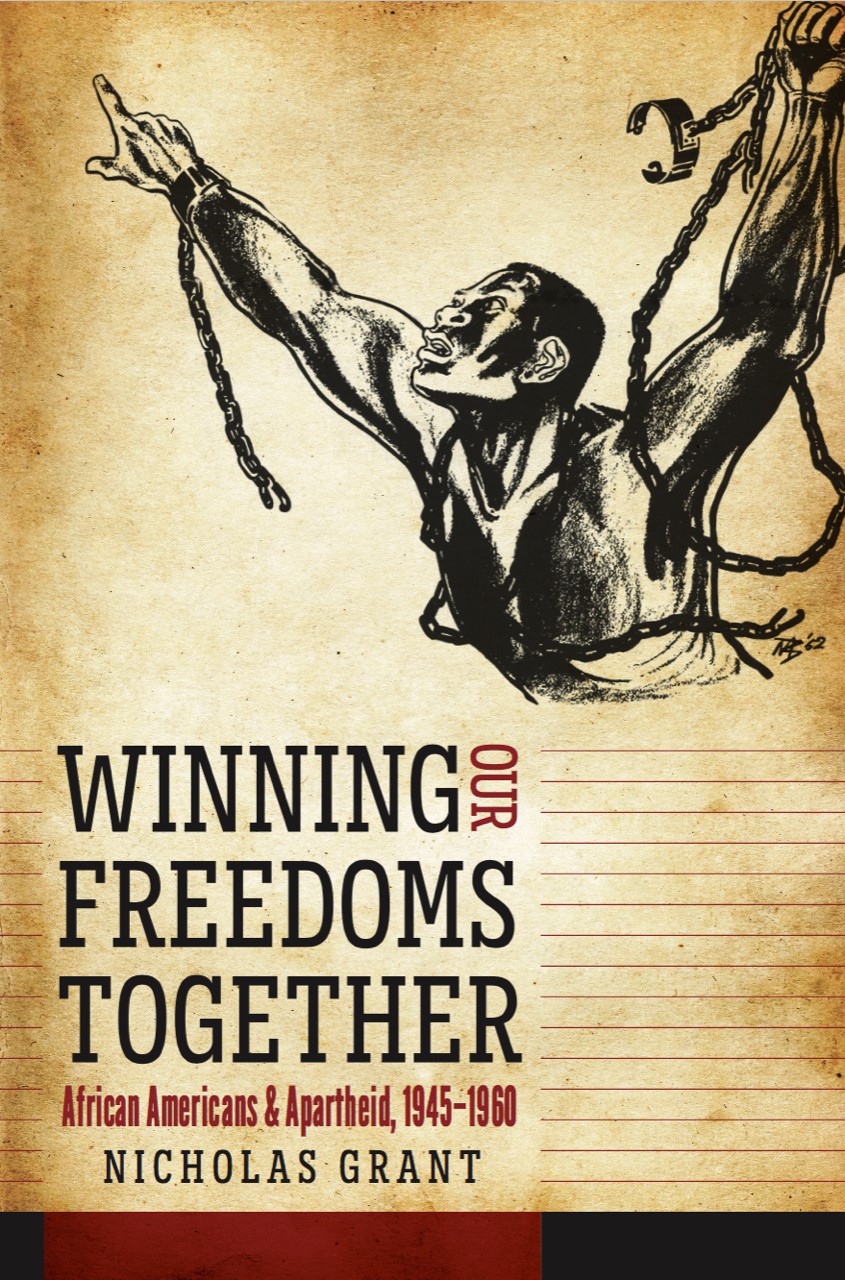Winning Our Freedoms Together: A New Book on African Americans and South Africans
This post is part of our blog series that announces the publication of selected new books in African American History and African Diaspora Studies. Winning Our Freedoms Together: African Americans and Apartheid, 1945-1960 was recently published by the University of North Carolina Press.
***
 The author of Winning Our Freedoms Together is Nicholas Grant. He completed his doctoral research at the University of Leeds in 2013 and he is now a Lecturer in American Studies at the University of East Anglia. His research engages with the fields of African American and black international history by examining how transnational political and cultural forces have shaped race relations in the United States. His work has appeared in the Radical History Review and Palimpsest: A Journal of Women, Gender and the Black International, and the Journal of American Studies. He also serves as the co-editor of the new open-access Radical Americas journal published through UCL Press. He is currently working on two new research projects. The first will assess how technology shapes debates about race and citizenship during the Cold war. The second project examines African American engagements with Africa in the 1970s. Follow him on Twitter @nicholasgrant.
The author of Winning Our Freedoms Together is Nicholas Grant. He completed his doctoral research at the University of Leeds in 2013 and he is now a Lecturer in American Studies at the University of East Anglia. His research engages with the fields of African American and black international history by examining how transnational political and cultural forces have shaped race relations in the United States. His work has appeared in the Radical History Review and Palimpsest: A Journal of Women, Gender and the Black International, and the Journal of American Studies. He also serves as the co-editor of the new open-access Radical Americas journal published through UCL Press. He is currently working on two new research projects. The first will assess how technology shapes debates about race and citizenship during the Cold war. The second project examines African American engagements with Africa in the 1970s. Follow him on Twitter @nicholasgrant.
In this transnational account of Black protest, Nicholas Grant examines how African Americans engaged with, supported, and were inspired by the South African anti-apartheid movement. Bringing Black activism into conversation with the foreign policy of both the U.S. and South African governments, this study questions the dominant perception that U.S.-centered anticommunism decimated Black international activism. Instead, by tracing the considerable amount of time, money, and effort the state invested into responding to Black international criticism, Grant outlines the extent to which the U.S. and South African governments were forced to reshape and occasionally reconsider their racial policies in the Cold War world.
This study shows how African Americans and Black South Africans navigated transnationally organized state repression in ways that challenged white supremacy on both sides of the Atlantic. The political and cultural ties that they forged during the 1940s and 1950s are testament to the insistence of Black activists in both countries that the struggle against apartheid and Jim Crow were intimately interconnected.
In this engaging transnational history, Grant not only demonstrates the connections between the freedom struggles of African Americans and Black South Africans, but also illuminates how and why these transnational linkages formed. Conceptually innovative and deeply grounded in archival work across multiple continents, this study weaves a fascinating story that will be a valuable resource for present and future scholars.”—Robert Trent Vinson, author of The Americans Are Coming!
Keisha N. Blain: Did you face any challenges conceiving of, researching, writing, revising, publishing, or promoting this book? If so, please share those challenges and how you overcame them?
Nicholas Grant: The late 1940s and 1950s can sometimes appear as a nadir in the long history of Black international organizing. Indeed, as historians such as Penny Von Eschen and Gerald Horne have outlined, anticommunist repression severely damaged the Black international left, at the same time as it placed pressure on Black liberals to embrace their Americanism and hold back in their criticisms of U.S. foreign policy.
Inspired by this work, Winning Our Freedoms Together examines the state of Black internationalism during the early Cold War by tracing the engagement of African Americans with the early anti-apartheid movement. However, as I began to consult archives in both the U.S. and South Africa, I was immediately struck by how Black activists continued to insist that their respective struggles against Jim Crow and apartheid were interconnected throughout this era. These records certainly shed light on the ways in which anticommunism bolstered white supremacist power and restricted Black international networks. However, they also often testify to the resilience and creativity of activists who were determined to challenge white supremacy across national borders.
One of the central issues that I therefore had to grapple with when writing this book was how to account for the devastating effects anticommunism had on Black activism, while also recognizing the agency of activists who struggled to sustain an internationalist agenda during the Second Red Scare. In response, I tried to uncover how African American leftists—who bore the brunt of McCarthyite repression—continued to engage with anti-apartheid politics from ever more limited and restricted spaces. Black radicals deliberately drew attention to what they argued were similar experiences of state repression in South Africa and the U.S., using this as a means to articulate further parallels between the racial practices of both countries. In addition to this—and perhaps somewhat controversially—Winning Our Freedoms Together also examines more liberal forms of Black internationalism. As white governments were attempting to forcibly remove radical Black voices from the global political arena, African Americans, working with more moderate organizations such as the NAACP, NCNW and ACOA, were expanding their international activities. While these activists were less overtly critical of the role American capital played in bolstering white settlerism in Southern Africa, they nevertheless made meaningful contributions to the anti-apartheid movement.
It is certainly true that black international politics was divided and less expansive during the early Cold War, but the commitment of African Americans to challenging white supremacy on a global scale was not erased entirely. This argument is not meant to downplay the disruptive influence that anticommunism had on Black politics. Rather, it is designed to shift focus onto the ways in which Black activists, with different political visions, responded to state power so that the urgent anticolonial calls of African leaders would not go unanswered.
Copyright © AAIHS. May not be reprinted without permission.
